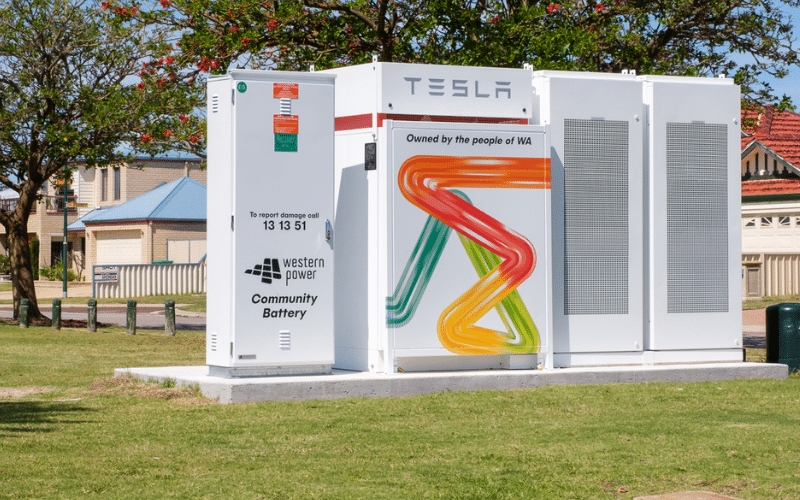Batteries are a hot topic in the Australian renewable energy industry and are an important component of the global transition to renewable energy. The rapid advancements of battery technology has allowed for solar panels and wind power to be stored and used at any time. Community-scale solar batteries could be the next step in renewable energy storage in Australia, and could play an integral role in our shift to a decentralised grid. Here we look at what community-scale solar batteries are, how they work, their benefits and their future feasibility in Australia.

What are community-scale solar batteries?
A community solar battery, also known as Community-scale Energy Storage (CES), is a shared neighbourhood battery solution that allows households with solar power to pool excess electricity. At its core, a community battery supports the grid by improving power reliability and smoothing power flow in a local area to enable further uptake of rooftop solar.
A community battery is typically the size of a 4WD vehicle, and provides anywhere from 100kW-5MW of storage that can potentially support hundreds of local households.
How do they work?
There are a number of different ownership models that a community battery can operate under. A community battery can either be owned by the community, and/or operated for the community (as virtual storage), or operated to benefit the community indirectly (e.g. through profits flowing back).
Most community battery trials currently underway in Australia use a PowerBank battery storage solution. A PowerBank is a different form of community battery model that integrates bulk solar battery storage into the existing electricity grid, while also providing customers with an option to virtually store their excess rooftop solar energy (usually to a set maximum kWh). Participating households can feed into the PowerBank during the day and draw electricity back during the afternoon and evening peak when their solar systems stop generating. This can directly save the customer money if they can buy back energy at a cheaper price than grid-sourced energy.
Some business models will only allow contributing households to access the stored energy, while others allow anyone access regardless of whether they have rooftop solar or not.
Two other types of community battery models are micro-grid batteries and virtual power plants (VPP). A micro-grid battery can be used as a backup power supply, which will assist when there is a fault on the main electricity network, power disruptions due to severe weather, or as part of an independent micro-grid for remote areas. Virtual power plants (VPP), differ from large scale community batteries in that they typically involve the collaborative input of multiple solar batteries (i.e. residential or pole-mounted) that can provide on-demand battery power to support the electricity grid in times of need.

Benefits of community solar batteries
Community batteries have the potential to provide social, economic and technical benefits to the broader energy system. While not all community battery program models offer the same benefits, below are some common perks:
Lower energy costs: Community solar batteries allow you to buy back excess power at a lower price than the energy offered by your retailer. Discharging batteries during peak-periods also facilitate ‘peak shaving’ by levelling out peaks in electricity use that drive up electricity prices.
Increased power reliability and stability: Community batteries make solar “visible” to network owners and operators, making it easier to manage daytime and peak-time load periods.
Increased hosting capacity: The ability to integrate more distributed energy resources (e.g. solar panels and electric vehicles) into the distribution grid without the construction of more expensive network assets to accept two-way flow of power.
Energy equity: Community batteries provide an opportunity for a wider range of individuals to access the benefits of renewable resources. Although solar panels are cheaper than ever before, they are still out of reach for some members of the community who either can’t afford the upfront cost or can’t practically put solar on their rooftop (i.e. apartment owners, renters).
A greener grid: With more people using renewable energy, there is less reliance on traditional sources of electricity which reduces our carbon emissions.
What about small-scale residential battery storage systems?
There’s no hiding the fact that Behind The Meter (BTM) battery systems at the individual or household level are still expensive. Preliminary findings show that community-scale batteries offer better overall value than home batteries at their current price.
There are, however, some benefits that BTM batteries offer that community solar can’t. Benefits include:
- Backup power
- Increased solar self-consumption
- Time-of-use bill management
For households looking to decrease reliance on the grid, a BTM battery is going to offer greater independence. It really comes down to individual choice and budget.

Future feasibility of community batteries in Australia
There have been several trials involving community solar batteries in Australia. These trials, primarily by distribution networks including Western Power and Ausgrid, have shown the potential for future viability.
Two of the key lessons from the trials, as reported by the Australian Renewable Energy Agency (ARENA), are that community-scale batteries are already financially viable, and that the technical capability for implementing community-scale storage on the National Electricity Market (NEM) already exists.
There are, however, a number of challenges that need to be overcome before we can see the widespread implementation of community solar batteries. Typically, these have been framed merely in economic and terms, yet the questions over how the benefits of the battery are to be distributed, how the risks are to be managed, and how all these should be governed are equally important.
The verdict…
The future of community-scale solar batteries in Australia appears bright. We may still be some years away from widespread implementation, but the technology is available and trials are showing promising results.
Looking at going solar? Join millions of Australians who have already made the switch to solar. Receive up to 3 FREE, obligation-free solar quotes from trusted local installers – it’ll only take you a few minutes! You can also call us on 1800 EMATTERS or email our friendly team for expert, obligation-free advice.











































